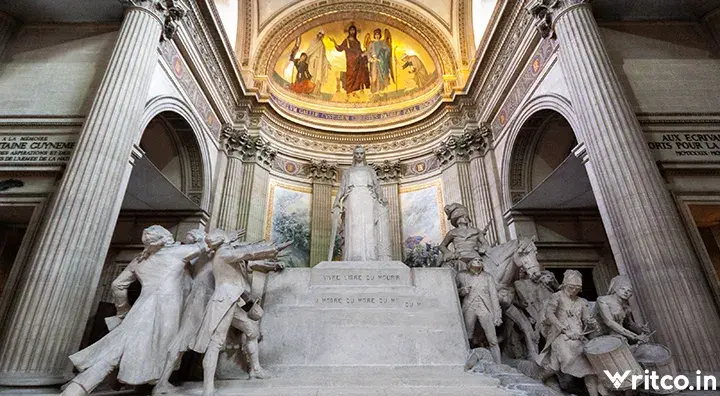Political leadership and Legacy
Legacy and leadership are deeply intertwined concepts that reflect the long-term impact and influence of individuals in positions of authority or influence:
- **Legacy**: Legacy refers to the lasting impact or imprint that a leader leaves behind, often after they have left their position of leadership or passed away. A leader's legacy can encompass various aspects, including their accomplishments, contributions to their organization or society, values they instilled, and the example they set for future generations. Legacies can be positive, negative, or a mix of both, shaping how the leader is remembered and the impact they have on the trajectory of their organization or community.
- **Leadership**: Leadership involves the ability to inspire, influence, and guide others towards a common goal or vision. Effective leaders demonstrate vision, integrity, decisiveness, empathy, and the ability to motivate and empower others. Leadership can take many forms, from leading teams or organizations to inspiring social movements or driving change at the national or global level. Leadership is not solely determined by one's title or position but rather by the ability to inspire and mobilize others to achieve shared objectives.
The relationship between legacy and leadership is complex. A leader's actions, decisions, and character during their tenure can significantly shape their legacy. Leaders who prioritize long-term goals, invest in developing future leaders, and leave their organizations or communities stronger and more resilient are more likely to leave a positive legacy. Conversely, leaders who prioritize short-term gains, act unethically, or fail to address critical challenges may leave behind a tarnished legacy.
Ultimately, effective leadership is about more than just achieving short-term success; it's about leaving a lasting impact that transcends one's time in office or position of authority. Leaders who prioritize serving others, fostering a culture of accountability and inclusion, and leaving their organizations or communities better off than they found them are more likely to leave behind a positive and enduring legacy.
The relationship between law enforcement and politics can have significant implications for governance, public safety, and the rule of law. Here are several key aspects of this relationship:
1. **Political Oversight and Accountability**: Law enforcement agencies are typically accountable to elected officials, such as mayors, governors, or national leaders, who appoint top officials, set policies, and allocate resources. Political leaders may also shape law enforcement priorities and strategies, reflecting their policy agendas and public safety concerns. However, excessive political interference in law enforcement operations can undermine professionalism, impartiality, and public trust.
2. **Policy Implementation**: Political decisions on issues such as crime prevention, immigration enforcement, drug policy, and community policing can directly impact law enforcement practices and priorities. Police departments may be tasked with implementing policies that reflect the values and priorities of elected officials, sometimes leading to tensions between law enforcement agencies and the communities they serve.
3. **Elections and Law Enforcement Leadership**: In some jurisdictions, law enforcement leadership positions, such as police chiefs and sheriffs, are elected positions. Political campaigns for these positions may involve debates over law enforcement policies, crime rates, community relations, and other issues, leading to politicization of law enforcement leadership roles.
4. **Civil Liberties and Human Rights**: Political decisions related to national security, counterterrorism, and public safety can sometimes intersect with civil liberties and human rights concerns. Law enforcement agencies may be tasked with balancing public safety imperatives with respect for individual rights and freedoms, raising questions about surveillance, profiling, use of force, and due process.
5. **Partisan Dynamics and Policing**: In some cases, partisan politics can influence perceptions of law enforcement and attitudes towards policing. Debates over issues such as police reform, racial profiling, use of force, and accountability measures may become politicized, with different political factions advocating for divergent approaches to law enforcement policy.
Overall, while political leadership and oversight are integral to the functioning of law enforcement agencies, maintaining professionalism, impartiality, and adherence to the rule of law is essential to ensure effective and legitimate policing in democratic societies. Balancing political imperatives with the need for independent, accountable, and rights-respecting law enforcement is an ongoing challenge for policymakers, law enforcement leaders, and civil society.
The relationship between the judiciary and politics is complex and multifaceted, with significant implications for governance, the rule of law, and the functioning of democratic systems:
1. **Independence of the Judiciary**: One of the fundamental principles of democratic governance is the independence of the judiciary from political influence. The judiciary is tasked with interpreting and applying the law impartially, without regard to political considerations or pressure from other branches of government. This independence is crucial for ensuring the rule of law and protecting individual rights and liberties.
2. **Checks and Balances**: In democratic systems with a separation of powers, the judiciary serves as a check on the powers of the executive and legislative branches. Courts have the authority to review the constitutionality of laws and government actions, ensuring that they comply with legal standards and respect fundamental rights. This role can sometimes lead to tensions between the judiciary and political actors, particularly when courts invalidate or strike down legislation or executive orders.
3. **Appointment and Confirmation**: The process of appointing judges and justices can be politicized, especially in systems where judges are nominated by political leaders and confirmed by legislative bodies. Political considerations may influence the selection criteria, nomination process, and confirmation hearings, leading to debates over judicial philosophy, ideology, and partisan affiliations.
4. **Judicial Activism vs. Restraint**: Debates over judicial activism, wherein courts actively shape public policy through their decisions, versus judicial restraint, wherein courts defer to elected officials and exercise caution in intervening in political matters, are common. These debates often reflect differing views on the proper role of the judiciary in a democratic society and the appropriate balance between judicial review and deference to elected representatives.
5. **Public Perception and Legitimacy**: The perceived legitimacy of the judiciary can be influenced by political dynamics, including public trust in the courts and perceptions of judicial impartiality. Political rhetoric and attacks on judicial independence can undermine public confidence in the judiciary and erode its legitimacy, potentially weakening its ability to fulfill its constitutional role effectively.
Overall, while the judiciary and politics are inherently interconnected within democratic systems, preserving the independence and integrity of the judiciary is essential for upholding the rule of law and maintaining the balance of power among branches of government.
Decisions and risk are closely intertwined concepts in various aspects of life, including business, finance, and personal choices:
- **Decisions** are choices made after considering various options and potential outcomes. They involve selecting a course of action from several alternatives based on available information, preferences, and goals. Decisions can range from everyday choices like what to eat for lunch to complex strategic decisions in business or government. Decision-making processes may be rational, intuitive, or a combination of both, depending on the context and the decision-maker's cognitive processes.
- **Risk** refers to the uncertainty or potential for loss or harm associated with a particular decision or action. It involves the likelihood of different outcomes, including both positive and negative consequences. Risks can arise from various sources, such as financial markets, natural disasters, technological failures, or human error. Managing risk involves identifying, assessing, and mitigating potential threats or adverse outcomes to minimize their impact and maximize opportunities for success.
In many cases, decisions involve weighing potential risks against expected benefits. Decision-makers must consider factors such as the probability and magnitude of different outcomes, their tolerance for risk, and the potential consequences of inaction. Effective decision-making requires understanding and managing risk appropriately to achieve desired objectives while minimizing potential harm or loss. Conversely, taking calculated risks can sometimes lead to innovation, growth, and positive outcomes. Balancing decisions and risk management is essential for navigating uncertainty and achieving successful outcomes in various contexts.
Political organization and funds management are two critical components of governance and administration:
- **Political organization** involves structuring the government and its institutions, establishing the framework within which decisions are made and policies are implemented. This includes defining the roles and responsibilities of various branches of government (such as the executive, legislative, and judicial branches), as well as the distribution of power and authority among different levels of government (local, regional, national). Political organization also encompasses electoral systems, political parties, and other mechanisms for citizen participation and representation.
- **Funds management**, on the other hand, pertains to the effective and responsible handling of financial resources within a political organization or government entity. This involves budgeting, accounting, taxation, expenditure planning, and financial reporting. Good funds management practices ensure that public funds are used efficiently, transparently, and in accordance with legal and ethical standards. It also involves managing public debt, investing in infrastructure and services, and balancing competing financial priorities to meet the needs of citizens and promote economic stability and growth.
Effective governance requires a balance between sound political organization and responsible funds management. Without proper political organization, decision-making processes can be chaotic and ineffective, leading to instability and inefficiency. Similarly, without effective funds management, governments may struggle to finance essential services, maintain public trust, and achieve their policy objectives. Both aspects are essential for the functioning and success of any political entity.
Kings, queens, and legacy are interconnected concepts often associated with monarchy and leadership:
- **Kings and queens** traditionally represent the highest authority in a monarchy, ruling over a kingdom or realm. They typically inherit their position through hereditary succession, but in some cases, they may ascend to the throne through other means such as marriage or conquest. Kings and queens are responsible for governing their realms, making decisions that affect their subjects, and upholding the stability and prosperity of their kingdoms.
- **Legacy** refers to the impact or influence that someone leaves behind, often after they have passed away or stepped down from a position of power. In the context of monarchs, their legacy can encompass various aspects including their accomplishments, policies, leadership style, and the state of their kingdom at the end of their reign. A monarch's legacy can shape the course of history, influencing future generations and how they are remembered.
The legacy of kings and queens is often intertwined with the broader history of their kingdom and dynasty. They may be remembered for their military conquests, cultural achievements, political reforms, or personal virtues and vices. The strength and longevity of a monarch's legacy can depend on factors such as the stability of their reign, the prosperity of their kingdom, and the opinions of historians and future generations.
Achievement and instincts are both important aspects of human behavior and success, but they operate in different ways:
- Achievement typically involves setting goals, working towards them, and experiencing a sense of accomplishment upon reaching them. It often requires planning, effort, persistence, and sometimes overcoming obstacles along the way. Achievements can be both short-term and long-term, ranging from completing a project to reaching a career milestone.
- Instincts, on the other hand, are innate behaviors or impulses that are driven by biological or evolutionary factors. They are often automatic and instinctual responses to stimuli in the environment, without the need for conscious thought or decision-making. Instincts can play a role in survival, reproduction, and social interactions, guiding behaviors such as fight or flight responses, nurturing offspring, and forming social bonds.
While achievements are often the result of conscious effort and deliberate actions, instincts can influence our behavior at a more primal level, shaping how we respond to various situations and stimuli. Both achievement and instincts can contribute to personal and professional success, but they operate on different levels and serve different purposes.
Mentors and coaches both play significant roles in guiding and supporting individuals, but they have distinct differences:
- A mentor is typically someone with more experience or expertise who provides guidance, advice, and support to a less experienced person, often referred to as a mentee. Mentoring relationships tend to be more long-term and focused on personal and professional development.
- A coach, on the other hand, is someone who helps individuals set and achieve specific goals, improve performance, and overcome challenges. Coaching relationships are often more structured and focused on short-term objectives, whether in sports, business, or personal development.
While mentors and coaches share the goal of helping others grow and succeed, their approaches and the nature of their relationships can vary based on the specific needs and circumstances of the individuals involved.
In "The Godfather" and in the mafia context in general, "Godfather" and "Don" are both titles associated with leadership and authority within the organized crime family.
- "Don" is a term used to refer to the head of a mafia family. In "The Godfather," Vito Corleone is the Don of the Corleone crime family.
- "Godfather" typically refers to a trusted mentor or sponsor, especially in the context of baptismal sponsors in the Catholic Church. In the film, Michael Corleone becomes the godfather to his sister's son, but he also becomes the new Don of the Corleone family after his father, Vito Corleone.
- **Legacy**: Legacy refers to the lasting impact or imprint that a leader leaves behind, often after they have left their position of leadership or passed away. A leader's legacy can encompass various aspects, including their accomplishments, contributions to their organization or society, values they instilled, and the example they set for future generations. Legacies can be positive, negative, or a mix of both, shaping how the leader is remembered and the impact they have on the trajectory of their organization or community.
- **Leadership**: Leadership involves the ability to inspire, influence, and guide others towards a common goal or vision. Effective leaders demonstrate vision, integrity, decisiveness, empathy, and the ability to motivate and empower others. Leadership can take many forms, from leading teams or organizations to inspiring social movements or driving change at the national or global level. Leadership is not solely determined by one's title or position but rather by the ability to inspire and mobilize others to achieve shared objectives.
The relationship between legacy and leadership is complex. A leader's actions, decisions, and character during their tenure can significantly shape their legacy. Leaders who prioritize long-term goals, invest in developing future leaders, and leave their organizations or communities stronger and more resilient are more likely to leave a positive legacy. Conversely, leaders who prioritize short-term gains, act unethically, or fail to address critical challenges may leave behind a tarnished legacy.
Ultimately, effective leadership is about more than just achieving short-term success; it's about leaving a lasting impact that transcends one's time in office or position of authority. Leaders who prioritize serving others, fostering a culture of accountability and inclusion, and leaving their organizations or communities better off than they found them are more likely to leave behind a positive and enduring legacy.
The relationship between law enforcement and politics can have significant implications for governance, public safety, and the rule of law. Here are several key aspects of this relationship:
1. **Political Oversight and Accountability**: Law enforcement agencies are typically accountable to elected officials, such as mayors, governors, or national leaders, who appoint top officials, set policies, and allocate resources. Political leaders may also shape law enforcement priorities and strategies, reflecting their policy agendas and public safety concerns. However, excessive political interference in law enforcement operations can undermine professionalism, impartiality, and public trust.
2. **Policy Implementation**: Political decisions on issues such as crime prevention, immigration enforcement, drug policy, and community policing can directly impact law enforcement practices and priorities. Police departments may be tasked with implementing policies that reflect the values and priorities of elected officials, sometimes leading to tensions between law enforcement agencies and the communities they serve.
3. **Elections and Law Enforcement Leadership**: In some jurisdictions, law enforcement leadership positions, such as police chiefs and sheriffs, are elected positions. Political campaigns for these positions may involve debates over law enforcement policies, crime rates, community relations, and other issues, leading to politicization of law enforcement leadership roles.
4. **Civil Liberties and Human Rights**: Political decisions related to national security, counterterrorism, and public safety can sometimes intersect with civil liberties and human rights concerns. Law enforcement agencies may be tasked with balancing public safety imperatives with respect for individual rights and freedoms, raising questions about surveillance, profiling, use of force, and due process.
5. **Partisan Dynamics and Policing**: In some cases, partisan politics can influence perceptions of law enforcement and attitudes towards policing. Debates over issues such as police reform, racial profiling, use of force, and accountability measures may become politicized, with different political factions advocating for divergent approaches to law enforcement policy.
Overall, while political leadership and oversight are integral to the functioning of law enforcement agencies, maintaining professionalism, impartiality, and adherence to the rule of law is essential to ensure effective and legitimate policing in democratic societies. Balancing political imperatives with the need for independent, accountable, and rights-respecting law enforcement is an ongoing challenge for policymakers, law enforcement leaders, and civil society.
The relationship between the judiciary and politics is complex and multifaceted, with significant implications for governance, the rule of law, and the functioning of democratic systems:
1. **Independence of the Judiciary**: One of the fundamental principles of democratic governance is the independence of the judiciary from political influence. The judiciary is tasked with interpreting and applying the law impartially, without regard to political considerations or pressure from other branches of government. This independence is crucial for ensuring the rule of law and protecting individual rights and liberties.
2. **Checks and Balances**: In democratic systems with a separation of powers, the judiciary serves as a check on the powers of the executive and legislative branches. Courts have the authority to review the constitutionality of laws and government actions, ensuring that they comply with legal standards and respect fundamental rights. This role can sometimes lead to tensions between the judiciary and political actors, particularly when courts invalidate or strike down legislation or executive orders.
3. **Appointment and Confirmation**: The process of appointing judges and justices can be politicized, especially in systems where judges are nominated by political leaders and confirmed by legislative bodies. Political considerations may influence the selection criteria, nomination process, and confirmation hearings, leading to debates over judicial philosophy, ideology, and partisan affiliations.
4. **Judicial Activism vs. Restraint**: Debates over judicial activism, wherein courts actively shape public policy through their decisions, versus judicial restraint, wherein courts defer to elected officials and exercise caution in intervening in political matters, are common. These debates often reflect differing views on the proper role of the judiciary in a democratic society and the appropriate balance between judicial review and deference to elected representatives.
5. **Public Perception and Legitimacy**: The perceived legitimacy of the judiciary can be influenced by political dynamics, including public trust in the courts and perceptions of judicial impartiality. Political rhetoric and attacks on judicial independence can undermine public confidence in the judiciary and erode its legitimacy, potentially weakening its ability to fulfill its constitutional role effectively.
Overall, while the judiciary and politics are inherently interconnected within democratic systems, preserving the independence and integrity of the judiciary is essential for upholding the rule of law and maintaining the balance of power among branches of government.
Decisions and risk are closely intertwined concepts in various aspects of life, including business, finance, and personal choices:
- **Decisions** are choices made after considering various options and potential outcomes. They involve selecting a course of action from several alternatives based on available information, preferences, and goals. Decisions can range from everyday choices like what to eat for lunch to complex strategic decisions in business or government. Decision-making processes may be rational, intuitive, or a combination of both, depending on the context and the decision-maker's cognitive processes.
- **Risk** refers to the uncertainty or potential for loss or harm associated with a particular decision or action. It involves the likelihood of different outcomes, including both positive and negative consequences. Risks can arise from various sources, such as financial markets, natural disasters, technological failures, or human error. Managing risk involves identifying, assessing, and mitigating potential threats or adverse outcomes to minimize their impact and maximize opportunities for success.
In many cases, decisions involve weighing potential risks against expected benefits. Decision-makers must consider factors such as the probability and magnitude of different outcomes, their tolerance for risk, and the potential consequences of inaction. Effective decision-making requires understanding and managing risk appropriately to achieve desired objectives while minimizing potential harm or loss. Conversely, taking calculated risks can sometimes lead to innovation, growth, and positive outcomes. Balancing decisions and risk management is essential for navigating uncertainty and achieving successful outcomes in various contexts.
Political organization and funds management are two critical components of governance and administration:
- **Political organization** involves structuring the government and its institutions, establishing the framework within which decisions are made and policies are implemented. This includes defining the roles and responsibilities of various branches of government (such as the executive, legislative, and judicial branches), as well as the distribution of power and authority among different levels of government (local, regional, national). Political organization also encompasses electoral systems, political parties, and other mechanisms for citizen participation and representation.
- **Funds management**, on the other hand, pertains to the effective and responsible handling of financial resources within a political organization or government entity. This involves budgeting, accounting, taxation, expenditure planning, and financial reporting. Good funds management practices ensure that public funds are used efficiently, transparently, and in accordance with legal and ethical standards. It also involves managing public debt, investing in infrastructure and services, and balancing competing financial priorities to meet the needs of citizens and promote economic stability and growth.
Effective governance requires a balance between sound political organization and responsible funds management. Without proper political organization, decision-making processes can be chaotic and ineffective, leading to instability and inefficiency. Similarly, without effective funds management, governments may struggle to finance essential services, maintain public trust, and achieve their policy objectives. Both aspects are essential for the functioning and success of any political entity.
Kings, queens, and legacy are interconnected concepts often associated with monarchy and leadership:
- **Kings and queens** traditionally represent the highest authority in a monarchy, ruling over a kingdom or realm. They typically inherit their position through hereditary succession, but in some cases, they may ascend to the throne through other means such as marriage or conquest. Kings and queens are responsible for governing their realms, making decisions that affect their subjects, and upholding the stability and prosperity of their kingdoms.
- **Legacy** refers to the impact or influence that someone leaves behind, often after they have passed away or stepped down from a position of power. In the context of monarchs, their legacy can encompass various aspects including their accomplishments, policies, leadership style, and the state of their kingdom at the end of their reign. A monarch's legacy can shape the course of history, influencing future generations and how they are remembered.
The legacy of kings and queens is often intertwined with the broader history of their kingdom and dynasty. They may be remembered for their military conquests, cultural achievements, political reforms, or personal virtues and vices. The strength and longevity of a monarch's legacy can depend on factors such as the stability of their reign, the prosperity of their kingdom, and the opinions of historians and future generations.
Achievement and instincts are both important aspects of human behavior and success, but they operate in different ways:
- Achievement typically involves setting goals, working towards them, and experiencing a sense of accomplishment upon reaching them. It often requires planning, effort, persistence, and sometimes overcoming obstacles along the way. Achievements can be both short-term and long-term, ranging from completing a project to reaching a career milestone.
- Instincts, on the other hand, are innate behaviors or impulses that are driven by biological or evolutionary factors. They are often automatic and instinctual responses to stimuli in the environment, without the need for conscious thought or decision-making. Instincts can play a role in survival, reproduction, and social interactions, guiding behaviors such as fight or flight responses, nurturing offspring, and forming social bonds.
While achievements are often the result of conscious effort and deliberate actions, instincts can influence our behavior at a more primal level, shaping how we respond to various situations and stimuli. Both achievement and instincts can contribute to personal and professional success, but they operate on different levels and serve different purposes.
Mentors and coaches both play significant roles in guiding and supporting individuals, but they have distinct differences:
- A mentor is typically someone with more experience or expertise who provides guidance, advice, and support to a less experienced person, often referred to as a mentee. Mentoring relationships tend to be more long-term and focused on personal and professional development.
- A coach, on the other hand, is someone who helps individuals set and achieve specific goals, improve performance, and overcome challenges. Coaching relationships are often more structured and focused on short-term objectives, whether in sports, business, or personal development.
While mentors and coaches share the goal of helping others grow and succeed, their approaches and the nature of their relationships can vary based on the specific needs and circumstances of the individuals involved.
In "The Godfather" and in the mafia context in general, "Godfather" and "Don" are both titles associated with leadership and authority within the organized crime family.
- "Don" is a term used to refer to the head of a mafia family. In "The Godfather," Vito Corleone is the Don of the Corleone crime family.
- "Godfather" typically refers to a trusted mentor or sponsor, especially in the context of baptismal sponsors in the Catholic Church. In the film, Michael Corleone becomes the godfather to his sister's son, but he also becomes the new Don of the Corleone family after his father, Vito Corleone.
Related Stories










